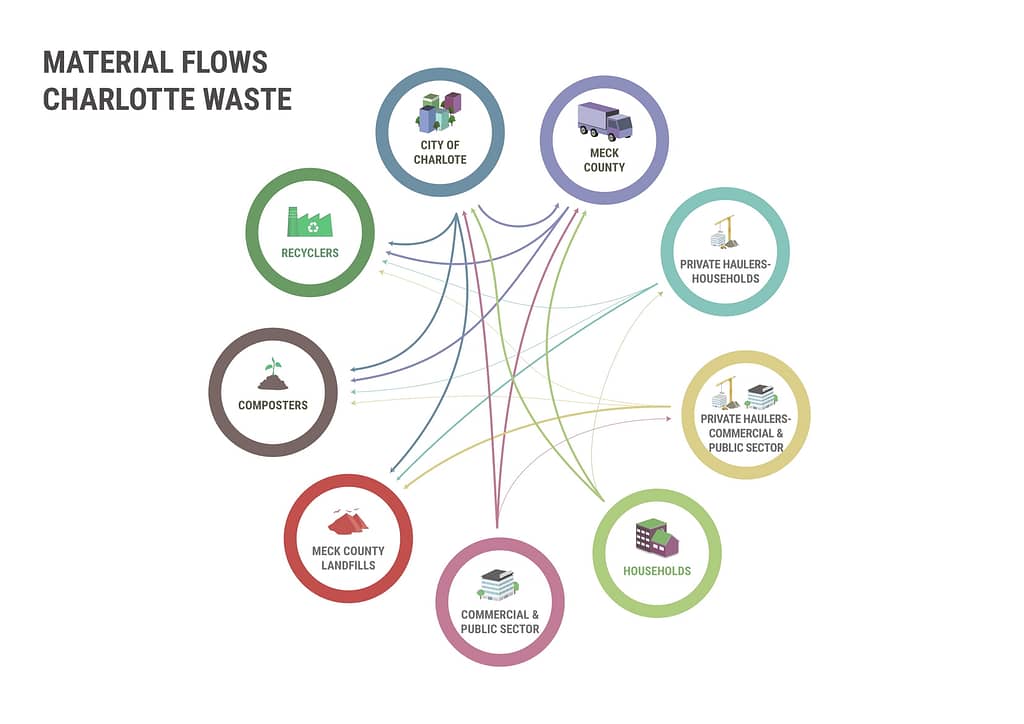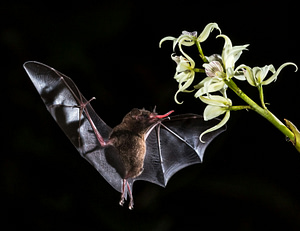The City of Charlotte has unveiled a strategy for a new, regenerative economic model designed to generate zero waste, thousands of jobs, and billions in revenue. It is a plan that involves upcycled fashion at an Innovation Barn, feeding food waste to soldier fly larvae, plus turning discarded glass into powder for concrete – and that’s just to get started.
The Circular Charlotte strategy was developed by Metabolic as part of a study commissioned by Envision Charlotte with the support of City staff. The study, Circular Charlotte: Towards a Zero Waste and Inclusive City, found the North Carolina city’s 900,000 tons of annual waste represent a residual value of roughly $111 million per year. By simply adopting a comprehensive waste diversion strategy, Charlotte could create more than 2,000 jobs by harnessing material instead of dumping it into ever-growing landfills. Going beyond that to a fully circular model could generate an estimated $2.3 billion in revenue by 2040.
The report forecasts how such a strategy could particularly benefit residents of lower-income areas which are already located nearby most the city’s waste management facilities. This geographic advantage makes it easier to plant the seed of a circular economy where it could be of most benefit by delivering jobs in all areas of the solid waste industry and in the innovative new industries that could emerge from better use of material waste. Additionally, measures such as reward points would financially incentivize recycling.

Soldier fly larvae and circular hotel linen
To begin the journey towards a circular economy the report proposes five business cases to improve social mobility and environmental outcomes through:
- the creation of 300 jobs by developing a circular industry based on feeding 50,000 tons of food waste to black soldier fly larvae, which can be converted into pellets to use as feed on North Carolina poultry farms;
- the diversion of 44,100 tons of waste from landfill every year by incentivizing citizens who recycle with reward points for discounts at local stores, providing potential financial benefits rather than financial penalties for lower socio-economic groups;
- the saving of 345,341 gallons of water by developing a closed-loop textiles chain for linens and uniforms used in hotels and hospitals, cutting demand for environmentally damaging cotton and polyester production and offering opportunities to work in a whole new industry;
- the provision of university student entrepreneurs (who might not otherwise be able to afford to develop their circular economy business ideas) with equipment, expert advice, and commercial feedback to develop circular economy business ideas at a startup incubator based at the Innovation Barn;
- the aversion of 41,186 in CO2e emissions by transforming concrete from demolition sites and powder created from discarded glass into new concrete, also creating new jobs.

Understand where the value is lost
“We started by understanding Charlotte’s current waste flows and where the value is being lost, and developed a strategy based on that,” said our cofounder and CEO Eva Gladek. “With just these five cases we could save around 100,000 -150,000 tons of waste-to-landfill, create up to 500 jobs, and cut CO2e emissions by 379,000 tons a year.”
This would just be the tip of the iceberg of the benefits of a fully circular economy which goes beyond recycling to developing products that are easily repaired and upcycled at high value, using renewable resources and avoiding toxic substances.
“We are thrilled to implement the circular economy strategy in Charlotte,” said Marcus D. Jones, Charlotte city manager. “The strategies outlined in the report will help Charlotte address key issues impacting the entire city – economic and social mobility. We fully expect Circular Charlotte, along with the work we do, to help us become the epicenter for people and cities to learn how to experiment, create and innovate.”
Raising the Innovation Barn
As a first step to pursuing this vision, the City of Charlotte invested $2 million into Envision Charlotte’s circular economy hub, dubbed the Innovation Barn, which will host a Raise the Barn Fundraiser + RePurposed Trashion Show on October 20. The fundraiser and “trashion” show will showcase upcycled high-fashion pieces by local clothing designers. Funds raised from the event will support the development of the Innovation Barn, which will connect local entrepreneurs in the emerging market of the circular economy.
“Envision Charlotte is excited to partner with the City of Charlotte to advance the Circular Economy, this initiative aligns perfectly with Envision Charlotte’s mission to create a more sustainable and efficient community,” Envision Charlotte Executive Director Amy Aussieker said. “We are excited to create an Innovation Center where we can advance Circular Charlotte via communicating, impacting and empowering.”
Envisioning a circular future
Furthering its commitment to the circular economy, the City of Charlotte has joined The Ellen MacArthur Foundation’s Circular Economy 100 (CE100), a program that brings together corporate bodies and governments to accelerate circular economy innovations. Our report recommends that the city capitalizes on its leadership in this area by branding itself as Circular Charlotte and launching visible measures such as prizes for circular projects, school education programs, and neighborhood action plans. Other short and medium term recommendations include the establishment of funding mechanisms, stricter waste regulations, enhanced waste processing capacity, and detailed data monitoring of waste streams.
In the long term, advanced scanning and sorting technologies for recyclables, circular procurement policies for government and a circular industry park will help add to Charlotte’s economic vitality and preserve scarce resources for the generations to come.
To read the full Circular Charlotte: Towards a Zero Waste and Inclusive City report, go here. To find out more, contact co-author of the report, our sustainability consultant Erin Kennedy at [email protected]






